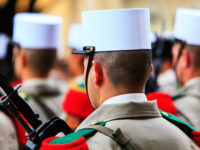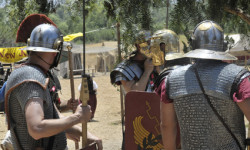The Foreign Legion is a large military unit integrated into the French Armed Forces, but consists mainly of foreign mercenaries. The current manpower is about 7699, foreign deployments take place in Afghanistan, Africa and South America. The Legion is one of the most modern and battle-proven units in the world.
Prerequisites:
- Candidates must be at least 17 1/2 years of age (parents' consent must be approved by the French embassy in the country concerned if they are under 18 years of age) and at most 40 years of age. Of course, the younger the younger the better the chances.
- Candidates must have valid documents (passport, identity card). Documents on training, medical records and any military service already performed should also be taken along.
- You can't have a serious criminal record. This is checked by the recruiting offices in the respective country. In addition, no warrant of arrest may be issued against him. Even minor penalties on the certificate of good conduct can result in a negative application.
- Physical fitness is a basic requirement. In addition, one should be healthy, glasses are still permissible up to a certain visual acuity, but reduce the chances. The following diseases make an application superfluous: HIV, hepatitis, TB, cancer, diabetes, anemia.
- In the Legion, French is spoken without exception (with the exception of communication between soldiers of the same nationality outside working hours). Therefore, at least a basic knowledge of French should be available. During the training you get language courses.
- You should be aware that when you join the Legion, there is no going back. Therefore there should be no obligations (apartment, car etc. ) any more.
What should a candidate bring?
In any case, valid documents (passport, identity card, international birth certificate not older than 6 months) are important. You should also bring between 50 and 100€ cash, change of clothes, sneakers and toiletries. Anything else would probably be unnecessary ballast and would be taken from a candidate.
Where does a candidate have to report?
Candidates must travel to one of the 11 recruitment offices (P. I. L. E. 's) at their own expense. Although these offices are officially open around the clock, you should introduce yourself there during normal working hours, including Saturdays and Sundays.
The costs of any visa fees will be borne without exception by the applicant, and the Foreign Legion will not provide any assistance in this regard. The Legion also does not assist in obtaining any necessary visas (for non-EU nationals requiring visas).
The recruitment offices are located in the following cities:
- Paris
- Lille
- Nantes
- Strasbourg
- Aubagne
- Bordeaux
- Lyon
- Marseille
- Nice
- Perpignan
- Toulouse
In these offices the first preselection for candidates is made. If one seems suitable from the first impression, one is sent to the two preselection centres (Centres de Preselection) either in Paris or Aubagne where a more intensive examination and questioning of the candidates is expected. If the requirements are also met there, they will be transferred to the main selection and integration centre of the Foreign Legion (C. S. I. - Centre de Selection et d'incorporation) in Aubagne (approx. 12 kilometres east of Marseille). There the physical and psychological tests really get going, especially since one also has to withstand the security talk of the Legion's secret service (D. S. P. L. E. ), previous convictions would become known by now at the latest.
Who successfully passes all tests can now sign the 5 year contract of the Legion. It goes without saying that this will not be negotiated.
The possibility of starting an anonymous life by joining the Legion has been largely suspended since 2011. You are registered with your real name. The only exceptions to this are candidates who are prosecuted in their home country for joining the Legion and who may even lose their citizenship, e. g. in Austria or Switzerland. Germany has abolished criminality since 2011, allowing Germans to serve legally in the Legion.
The first time as a legionnaire:
If you think you can go home again after signing the contract to do things, cancel your flat or buy underwear, you are wrong. Immediately after signing, the new recruit in the rank Legionary 2nd class (légionnaire 2ème classe) goes to the 4eme Regiment Etranger in Castelnaudary (the training regiment of the Foreign Legion) to complete his 15-16 weeks of basic training there. There is also a 6 month trial period in which the new legionaries are observed and evaluated, so who believes after signing the contract one can no longer be thrown out of the legion is also wrong here.
After the basic training you will be assigned to one of the regiments. Even you have no influence on this decision, the Legion uses you where it makes the most sense for you.
The locations of the Foreign Legion (as of 2014):
- 1er Régiment Etranger (Aubagne, Bouches-du-Rhône)
- 4ème Régiment Etranger (Castelnaudary, Aude)
- 1er Régiment Etranger de Cavalerie (Camp de Carpiagne, near Cassis, Bouches-du-Rhône)
- 2ème Régiment Etranger d'Infanterie (Nîmes, Gard)
- 1er Régiment Etranger de Génie (Laudun, Gard)
- 2ème Régiment Etranger de Génie (Saint Christol, Vaucluse)
- 2ème Régiment Etranger de Parachutistes (Calvi, Korsika)
- 3ème Régiment Etranger d'Infanterie (Kourou, French Guyana/South America)
- 13ème Demi-Brigade de la Légion étrangère (Abu Dhabi, United Arab Emirates
- ab 2016 Camp du Larzac, northwest of Montpellier/France
- Détachement de la Légion étrangère à Mayotte (Mayotte, Indian Sea)
During the period of service at the Foreign Legion, a two-year overseas stay (Sejour / M. L. D. ) or several short-term (4-6 months = M. C. D. ) overseas stays in Djibouti (there only M. C. D. ), French Guyana or on the island Mayotte in the Indian Ocean is very likely.
Addendums:
A legionnaire's salary after basic training is €1,280 net. Up to the rank of Caporal, accommodation, food, pension and health insurance as well as working clothes are provided by the Legion. You only have to pay for the costs of accident and life insurance yourself. Of course, in addition to the basic salary there are a number of allowances such as off-road days, service outside France, combat operations etc. and as in every other army, the basic salary increases with years of service and rank.
The legionary can also apply for French citizenship after 3 years of service. As a rule, this is also granted. There would also be the possibility of applying for a renewable 10-year residence permit.
At the end of the 5-year contract, the legionary can leave the legion in an honorary manner and, if necessary, exercise the qualifications acquired during the period of service such as accountant, truck and bus driver, bricklayer, electrician, car mechanic, etc. . Secondly, he can extend his contract for 6 months, 1, 2 or 3 years. After 21 years of service you are also entitled to an immediate pension. Lower years of service mean a reduction in the pension. Legionaries who have served for less than 5 years are also entitled to pension payments, but these are only paid when they enter the civil retirement age, Germany for example 67 years.
You can find the right literature here:
My Camp: Life in the French Foreign Legion
Follow the story of a young man, who, through a chance encounter in prison, leaves his life of crime and joins the ranks of one of the world's toughest fighting forces. J. R. Lawrence served in the 3rd company of the parachute regiment (2REP) from 2007 - 2011. The author served in the Foreign Legion during the War on Terror period and the book includes a chapter on the war in Afghanistan.
The French Foreign Legion
The French Foreign Legion is an extraordinary and unique army, specifically created for foreign nationals wishing to serve in the French Armed Forces, but commanded by French officers. For nearly two centuries, adventure seekers or men on the run from all around the globe have found a home in the Foreign Legion and shed blood for France. In this book, author Douglas Boyd has been given unrivalled access to the Legion to tell its story from its inception in the 1830s, when it was primarily used to protect and expand the French colonial empire during the nineteenth century, but it has also fought in almost all French wars including the Franco-Prussian War and both World Wars. The Legion is today known as an elite military unit whose training focuses not only on traditional military skills, but also on its strong esprit de corps.
Fighting for the French Foreign Legion: Memoirs of a Scottish Legionnaire

Fighting for the French Foreign Legion: Memoirs of a Scottish Legionnaire Hardcover – November 19, 2009
This is a very rare and fascinating account of life as a modern day Legionnaire. The author describes how, with no French language ability, he approached recruiters for the French Foreign Legion in Paris and the demanding selection process that followed. When he was accepted, he and other prospective legionnaires were sent to Southern France to begin the harsh recruit training course. The mix of different nationalities and backgrounds among his fellows was enormous. New members are traditionally allowed to change their identities - the author chose to alter his age becoming 28 not 38! Elite paratrooper training followed in Corsica before the author earned his 'wings'.
The FFL is never far from the front line and we read of challenging active service in former French colonies in Africa as well as during the First Gulf War, evicting Saddam Hussein from Kuwait and operations in Bosnia and Sarajevo.
This is a completely authentic book that lifts the veil of mystery and myth and reveals much about the realities of service in the Foreign Legion. The author is not given to exaggeration - there is no need for it. A gripping read.
Legion of the Lost: The True Experience of an American in the French Foreign Legion

Legion of the Lost: The True Experience of an American in the French Foreign Legion Paperback – January 19, 2016
Revised 2nd edition, with a new foreword and afterword from the author.
'From an air-conditioned Chicago office, Mr. Salazar took the express elevator straight to hell. Legion of the Lost is his story, the improbable, very funny tale of a sensitive, bookish child of Mexican immigrants who walked away from a promising career and, for romantic reasons, threw in his lot with a motley assortment of thugs, drunks, drug abusers and desperate refugees from the far corners of the earth. And those are the ones giving orders.'
This post is also available in:
 Deutsch (German)
Deutsch (German)  Français (French)
Français (French)  Italiano (Italian)
Italiano (Italian)  简体中文 (Chinese (Simplified))
简体中文 (Chinese (Simplified))  Русский (Russian)
Русский (Russian)  Español (Spanish)
Español (Spanish)  العربية (Arabic)
العربية (Arabic)


















